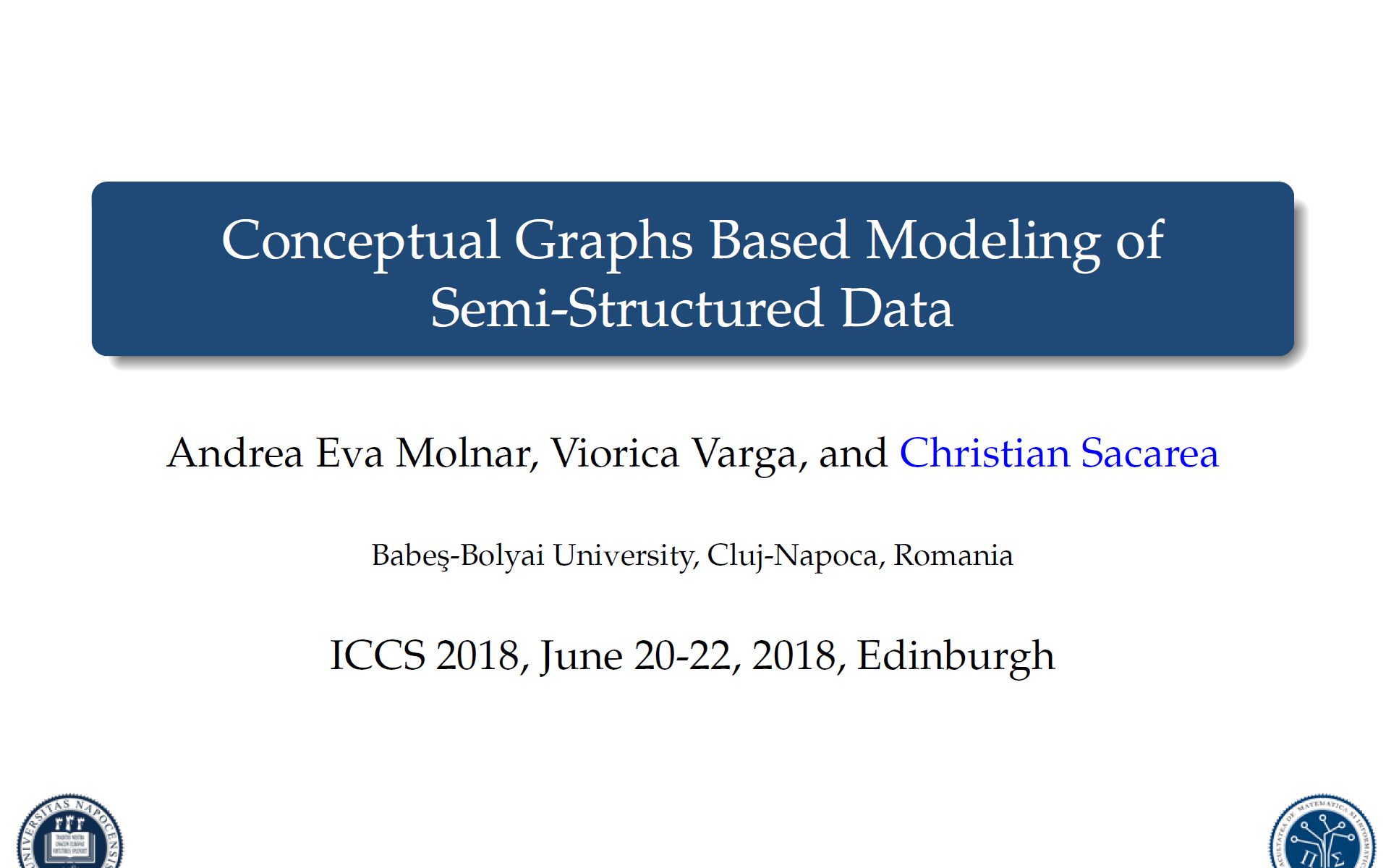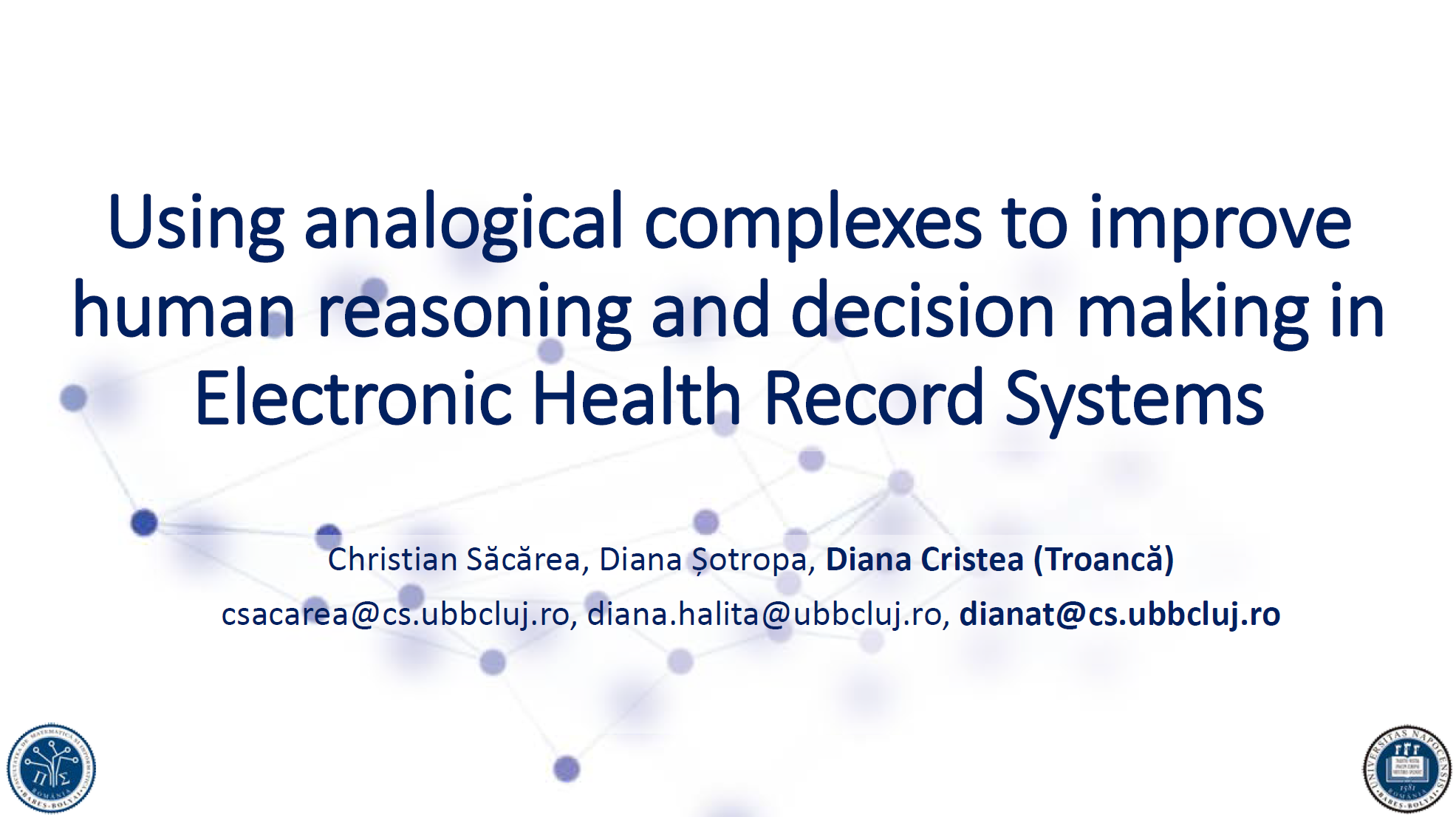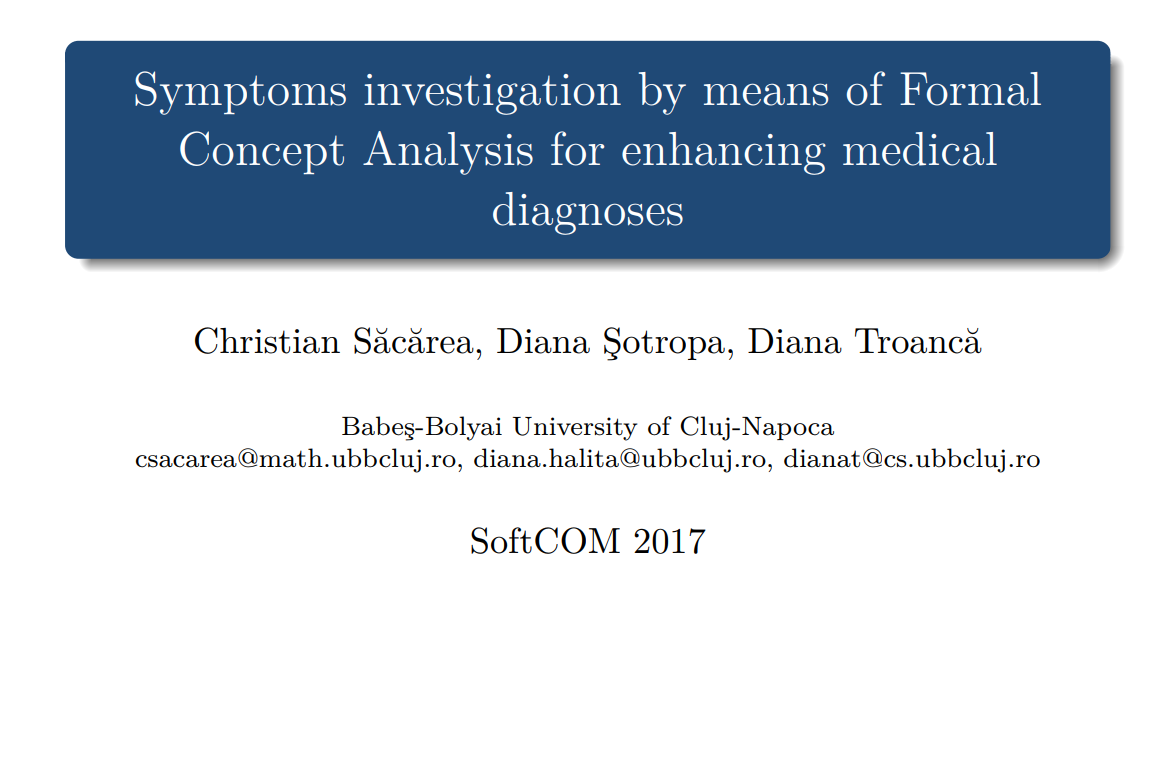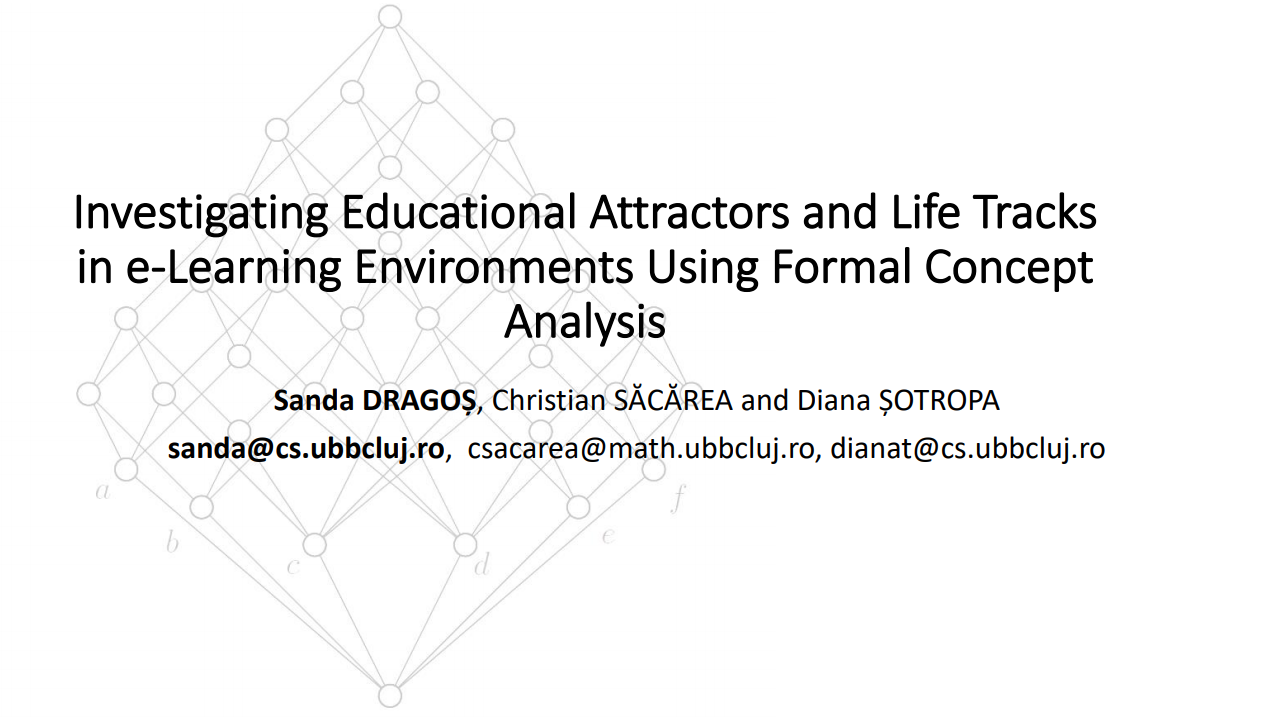Abstract:
Tools that focus on static code analysis for early error detection are of utmost importance in software development, especially since the propagation of errors is strongly related to higher costs in the development
process. Formal Concept Analysis is a prominent field of applied mathematics that uses conceptual landscapes to discover and represent maximal clusters of data. Its expressive visualization method makes it suitable for exploratory analyses in different fields. In this paper we present a Formal Concept Analysis framework for static code analysis that can serve as a model for quantitative and qualitative exploration and interpretation of such results.
Keywords:
formal concept analysis, static analysis, code review
On the use of FCA models in static analysis tools to detect common errors in programming
Abstract:
Static code analysis is widely used to detect code quality issues before execution. Thus, it can provide information that is important for improving programming skills. Such tools have been successfully used in teaching programming courses. In this paper we present algorithms for combining Formal Concept Analysis (FCA) with Pylint, a static code analysis tool, in order to detect and assess behavioral patterns in students’ programming styles. We design a generalized framework that can be subsequently used to analyze any category/subset of errors. We apply the approach for detecting common errors related to design by considering two scenarios that tackle object oriented design and increased code complexity. We argue how the results can be used to understand common mistakes and to improve the teaching content and methods.
Keywords:
Formal concept analysis
Static code analysis
Computer science education
Knowledge Discovery and Visualization in Healthcare Datasets using Formal Concept Analysis and Graph Databases
Abstract:
Among the major advances in Artificial Intelligence we
can mention Knowledge Discovery, Processing and Representation. Since in our modern society the healthcare system plays an important role and has a major impact in our daily lives, it lies at hand to apply the aforementioned methods in order to discover relevant patterns in healthcare databases and then to represent them in a way which supports reasoning, decision making, and communication. We approach this task by using two complementary directions, which are then interlinked. On the one hand we make use of the graphical representation capabilities of Formal Concept Analysis (FCA) and its powerful algorithms for conceptual knowledge discovery and processing. On the other, we use graph databases as a complementary visualization method of the extracted knowledge patterns. We exemplify this approach on a particular medical dataset, highlighting a 3D representation of conceptual hierarchies by using virtual reality (VR).
Keywords:
Knowledge Discovery, visualization method, Formal Concept Analysis , knowledge patterns
Formal Concept Analysis Grounded Knowledge Discovery in Electronic Health Record Systems
Abstract:
Formal Concept Analysis (FCA) is a prominent research field having its roots in applied mathematics. Based on a mathematization of concepts and their hierarchies, FCA and its varieties have the potential to unify knowledge discovery methodologies. This paper is devoted to a summary of FCA applications in mining relevant conceptual landscapes from medical data. Electronic Health Records (EHR) constitute a significant technological advance in the way medical information is stored, communicated and processed. Digitized information systems are employed with the aim to improve efficiency, quality of care and costs. We are interested in combining different analysis techniques and visualization methods, such as analogical reasoning, FCA and graph databases in order to bring a fresh perspective over the medical process and to improve the task of knowledge discovery in EHR systems.
Keywords:
Electronic Health Record, Knowledge Discovery, Formal Concept Analysis,
Using Recommender Systems to Support Navigation in Concept Lattices
Abstract:
Formal Concept Analysis (FCA) is a prominent field of Applied Mathematics grounded on the formalization of the notions of concept and concept hierarchy. Based on the expressive power of the graphical representation of knowledge clusters as order diagrams, FCA is an expanding field, rooted now mainly in Knowledge Discovery and AI. This paper is devoted to a new idea for concept lattice navigation, based on recommender systems and a local navigation approach. By this we overcome one of the main problems in this field and propose an intelligent navigation assistant through the conceptual hierarchy. At each step, the visualization is limited to a local view consisting of three levels in the concept lattice and a recommender system provides the necessary navigation assistance.
Keywords:
Formal Concept Analysis, Recommender Systems, Analogical Proportions, Similarity
Conceptual Graphs Based Modeling of Semi-Structured Data
Abstract:
Due to the fast growing of data in the digital world, not only in volume but also in its variety (structured, unstructured or hybrid), traditional RDBMS are complemented with a rich set of systems, known as NoSQL. One of the main categories of NoSQL databases are document stores which are speci
cally designed to handle semi-structured data, for instance XML documents. In this paper, we present a modeling method for semi-structured data based on Conceptual Graphs and exemplify the method on an XML document. The expressive power of Conceptual Graphs makes them particularly suitable for conceptual modeling of semi-structured data.
Keywords:
Conceptual Graphs, conceptual modeling, semi-structured data
Using analogical complexes to improve human reasoning and decision making in Electronic Health Record Systems
Abstract:
A key ability of human reasoning is analogical reasoning. In this context, an important notion is that of analogical proportions that have been formalized and analyzed in the last decade. A bridging to Formal Concept Analysis (FCA) has been brought by introducing analogical complexes, i.e. formal concepts that share a maximal analogical relation enabling by this analogies between (formal) concepts. Electronic Health Record (EHR)
systems are nowadays widespread and used in different scenarios. In this paper we consider the problem of improving EHR systems by using analogical complexes in an FCA based setting. Moreover, we present a study case of analogical complexes in a medical field. We analyze analogical proportions in Electronic Health Record Systems and prove that EHRs can be improved with an FCA grounded analogical reasoning component. This component offers methods for knowledge discovery and knowledge acquisition for medical experts based on patterns revealed by analogies. We also show that combining analogical reasoning with FCA brings a new perspective on the analyzed data that can improve the understanding of the subsequent knowledge structures and offering a valuable support for decision making.
Keywords:
Formal Concept Analysis, Analogical Complexes, Electronic Health Record Systems
Symptoms investigation by means of Formal Concept Analysis for enhancing medical diagnoses
Abstract:
Pattern extraction is one of the major topics in Knowledge Discovery. Out of numerous data mining techniques we propose to use a new approach: Formal Concept Analysis (FCA) together with Graph Databases with the implementation Neo4j. FCA is a prominent field of applied mathematics using maximal clusters of object-attribute relationships to discover and represent knowledge structures. The use of FCA gained much importance in many research domains in recent years. Despite the similarity of the graph representation between FCA and Neo4j, the structure and relations among the elements are represented differently and can offer a different perspective on the analysis.
This paper gives more insight into how patterns can be extracted from medical data and interpreted by means of FCA and Neo4j in order to help medical staff improve the accuracy of diagnoses. We examine the factors related to patients' symptoms and diagnostics and then compare the results with the ones provided by a medical care center.
We apply knowledge discovery techniques and conceptual landscapes paradigm in order to obtain an in-depth and high qualitative knowledge representation of medical data.
By making use of the effectiveness and the graphical representation of conceptual hierarchies we extract valuable knowledge from medical data sets through which we solve the knowledge discovery, processing and representation task in Electronic Health Record systems.
Keywords:
Formal Concept Analysis, Electronic Health Record, medical data, many-valued contexts, conceptual scaling, Triadic FCA, Neo4J
Investigating Educational Attractors and Life Tracks in e-Learning Environments Using Formal Concept Analysis
Abstract:
E-learning platforms are widely used in modern education. While in the traditional education the instructor does not have a comprehensive insight on how his students are using the educational resources, the situation is different for online learning environments. Web usage logs comprise a variety of information regarding the visited pages. These web-logs become a rich resource for data analysis. Understanding usage patterns from web-logs is widely used in order to improve web-based applications. In our research we are interested in distilling valuable knowledge on users behavior in online educational platforms using the knowledge discovery and processing methods of Formal Concept Analysis (FCA). This knowledge can then be used to understand how students are using the educational resources, to gain insight on their online behavior as well as how they use these resources over time. In this paper, we focus on the detection of behavioral patterns in web-based e-learning environments and on how users adhere to intended educational attractors. For this, we first use FCA to investigate so-called educational attractors and then distill users life tracks using Temporal Concept Analysis. We exemplify the developed methods on a locally developed e-learning platform called PULSE.
Keywords:
Life tracks, Temporal Concept Analysis, Web logs analysis, Conceptual structures, User behavior, Attractors
An investigation of user behavior in educational platforms using Temporal Concept Analysis
Abstract:
In this paper, we focus on the problem of investigating user behavior using conceptual structures distilled from weblogs of an educational e-platform. We define a set of so-called attractors as sets of scales in conceptual time systems and compute user life tracks in order to highlight different types of behaviors. These life tracks can give valuable feedback to the instructor how his students are using the online educational resources, analyzing their behavior and extracting as much knowledge as possible from the log access files. This might also be helpful to analyze the usability of the online educational content, eventually for improving the structure of the platform and to develop new educational instruments.
Keywords:
Life tracks, Temporal Concept Analysis, Web logs analysis, Conceptual structures, User behavior, Attractors






